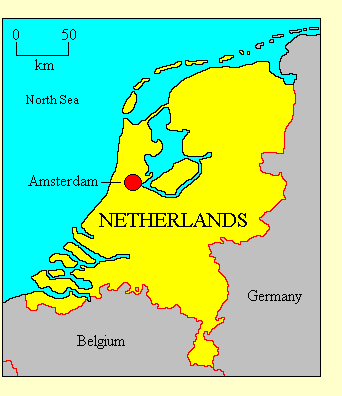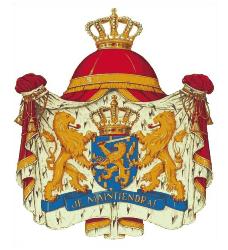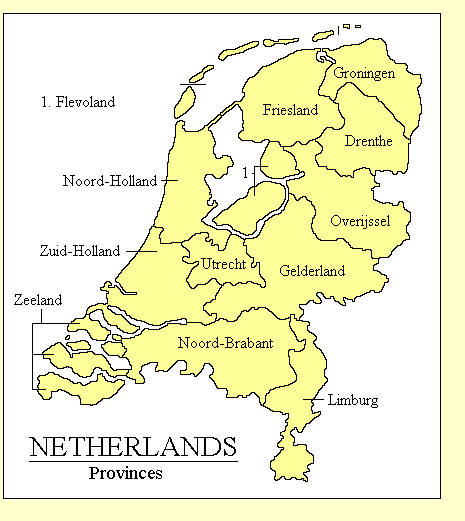

KINGDOM OF THE NETHERLANDS
• Official name: Koninkrijk der Nederlanden (Kingdom of the Netherlands)
• Location: Western Europe
• International organisations: Council of Europe, European Union, North Atlantic Treaty
Organisation, Organisation for Economic Co-operation and Development, Organisation for Security
and Co-operation in Europe, United Nations, Western European Union, World Trade Organisation
• Borders: Belgium, Germany
• Coastline: North Sea
• Land area: 41,526 Km2
• Population: 16,600,000
• Annual GDP (PPP) per capita: US$39,200 (2009 CIA estimate). World ranking: 16
• Ethnicity: Dutch 83%, other Europeans 6%, non-European migrants (mainly Turks, Moroccans, Antilleans, Surinamese and Indonesians) 9%
• Languages: Dutch is the official language and is almost universally understood. Turkish, Arabic and Indonesian languages are used in the migrant communities.
• Religion: The Netherlands is a highly secularised country. About 40% profess no
religion. Nominal Christian 50% (Catholic 30%, Protestant 20%), Muslim 5%, others 4%.
• Form of government: Constitutional monarchy and parliamentary democracy. The Netherlands is divided into 12 provinces.

• Capital: Amsterdam is the royal capital, The Hague (Den Haag) is the seat of government.
• Constitution: The Constitution of the Netherlands dates from 1814, but has been amended many times since.
• Head of state:
Beatrix, Queen of the Netherlands since 30 April 1980.
• Head of government: The Prime Minister, appointed by the Queen. The Prime Minister is usually the leader of a coalition of parties which can command a majority in the lower house of the legislature, to which he is accountable.
• Legislature: The Netherlands has a bicameral legislature, the Estates-General (Staten-Generaal). The lower house, the
Second Chamber (Tweede Kamer), has 150 members, elected for four-year terms by
proportional representation. The upper house, the First Chamber (Eerste
Kamer) has 75 members, elected for four-year terms by members of the provincial councils.
• Electoral authority: Elections in the Netherlands are conducted by
the Elections Council.
• Freedom House 2011 rating: Political Rights 1, Civil Liberties 1
• Transparency International Corruption Index: 88% (7 of 178 countries rated)
• Reporters Without Borders Press Freedom 2010 Index: 100% (1 of 178 countries rated)
• Heritage Foundation Economic Freedom 2010 Index: 74.7% (15 of 179 countries rated)
Political history
The Netherlands has been an independent state since 1572, when the Protestant cities of Holland
rebelled against Spain, which had ruled the area since the early 16th century. The independence of the
Dutch Republic was finally recognised in 1609. The Republic was a federation of provinces, each with
its own Estate-General but recognising the sovereignty of the hereditary Stateholder. The Netherlands
was absorbed into Napoleon's empire in 1795, first as the Batavian Republic and then as the Kingdom of
Holland. In 1815 the Congress of Vienna created the Kingdom of the Netherlands under the House of
Orange-Nassau.

The kingdom originally included Belgium and Luxembourg, but Catholic Belgium rebelled against
Dutch rule in 1830. This debacle discredited the royal government and in 1847 King Willem I was forced
to agree to a constitution which established parliamentary government. Full democratic government
followed in 1877. Luxembourg became independent in 1890.
For most its history Dutch politics revolved around the conflict between Catholics and
Protestants, and also between liberals and conservatives. From the 1890s, however, the rise of
socialist parties reshaped party conflicts. The Netherlands was under German occupation from 1940 to
1945. After the war rapid secularisation led to the end of old sectarian conflicts and the Netherlands
developed a reputation as one of Europe's most liberal countries.
From 2002 to 2010 Jan Peter Balkenende led a conservative coalition of the
Christian-Democratic Appeal (CDA), a moderate Christian democrat party
formed in 1980 from the union of older Catholic and Protestant parties, and the
People's Party for Freedom and Democracy (VVD), an orthodox conservative
party. Other parties on the right include the anti-immigration Freedom
Party (PVV), and two small religious parties, the
Christian Union and the
Political Reformed Party (SGP).
The largest opposition party is the
Labour Party (PvdA), a moderate social-democratic party. But Labour's
domination of the left has been weakened by the rise of the
Socialist Party (PS) and the
Green Left. Also on the left are the
Democrats 66, a party of the middle-class left, and the
Party for the Animals, an animal
welfare party.
At the 2010 election the parties of the right increased their majority, but the VVD overtook
the CDA as the largest party in the coalition. As a result Balkenende resigned and a new coalition
government under VVD leadership was formed by Mark Rutte.
Updated November 2011
|


